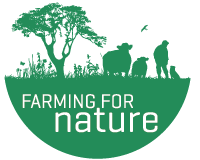James Forrest
James Forrest farms in the Glaskeelan Catchment near Letterkenny in County Donegal. The 140-acre farm contains a mix of land, ranging from bog to wet grassland to some better grassland. James runs a flock of 120 lowland ewes, producing and selling store lambs. The farming system is conventional and extensive. Silage is cut off the better land and external inputs are low.
James is a participant farmer in the Pearl Mussel EIP, a project that rewards farmers for the ecological quality of their land, which in turn contributes to the pristine water quality needed by the Freshwater Pearl Mussel. James has carried out over 2km of drain blocking to aid peatland restoration on his farm as part of the project. He is also working to remove invasive rhododendron plants from the land. James takes great pride in playing an important role in protecting an endangered species like the freshwater pearl mussel. He wishes to hand over the farm to his daughter in better condition in which he found it, and he encourages her to do the same. “I encourage my daughter to look after the farm and use the land wisely. And most importantly to leave the land in proper condition for the next generation.”
Nomination:
James Forrest farms in the Glaskeelan Catchment in Donegal. He farms 140 lowland ewes on a mosaic of wet grassland and peatland. James is a participant farmer in the Pearl Mussel Project EIP. The Pearl Mussel Project rewards farmers for the ecological quality of their land, which in turn contributes to the pristine water quality needed by the Freshwater Pearl Mussel.
James farms in the Glaskeelan Pearl Mussel Catchment. He is very engaged with improving the quality of the habitats and he is focused on leaving the farm in a sustainable way to pass on to his daughter. James has carried out over 2km of drain blocking to aid peatland restoration on his farm as part of the project. He has been very involved in the drain blocking process and takes great pride in how well the vegetation has started to recover on the site.
James is a great ambassador for the Pearl Mussel Project. His enthusiasm in seeing the results and understanding the benefits of these measures for the habitats has encouraged other farmers in the area. He is very generous with his time and knowledge. He is always happy to allow access to his land to groups to demonstrate the drain blocking measures he has undertaken and the recovery of the site.
James sees the value of programmes like the Pearl Mussel Project and likes the fact that “he is doing his bit for the environment and been rewarded for it”
Nominator: Mary McAndrew




